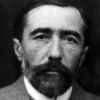Joseph Conrad

Joseph Conrad
Joseph Conradwas a Polish-British writer regarded as one of the greatest novelists to write in the English language. He joined the British merchant marine in 1878, and was granted British nationality in 1886. Though he did not speak English fluently until he was in his twenties, he was a master prose stylist who brought a non-English sensibility into English literature. He wrote stories and novels, many with a nautical setting, that depict trials of the human spirit in the midst...
NationalityPolish
ProfessionNovelist
Date of Birth3 December 1857
CountryPoland
The terrorist and the policeman both come from the same basket. Revolution, legality--counter-moves in the same game; forms of idleness at bottom identical.
A modern fleet of ships does not so much make use of the sea as exploit a highway.
Happiness, happiness ... the flavor is with you-with you alone, and you can make it as intoxicating as you please.
In the time of Spanish rule, and for many years afterwards, the town of Sulaco--the luxuriant beauty of the orange gardens bears witness to its antiquity--had never been commercially anything more important than a coasting port with a fairly large local trade in ox-hides and indigo.
Certain streets have an atmosphere of their own, a sort of universal fame and the particular affection of their citizens. One of such streets is the Cannebiere, and the jest: "If Paris had a Cannebiere, it would be a little Marseilles" is the jocular expression of municipal pride. I, too, I have been under the spell. For me it has been a street leading into the unknown.
There is, as every schoolboy knows in this scientific age, a very close chemical relation between coal and diamonds. It is the reason, I believe, why some people allude to coal as "black diamonds." Both these commodities represent wealth; but coal is a much less portable form of property.
As to honor - you know - it's a very fine mediaeval inheritance which women never got hold of. It wasn't theirs.
A man's real life is that accorded to him in the thoughts of other men by reason of respect or natural love.
For a moment I had a view of a world that seemed to wear a vast and dismal aspect of disorder, while, in truth, thanks to our unwearied efforts, it is as sunny an arrangement of small conveniences as the mind of man can conceive.
And suddenly I rejoiced in the great security of the sea as compared with the unrest of the land, in my choice of that untempted life presenting no disquieting problems, invested with an elementary moral beauty by the absolute straightforwardness of its appeal and by the singleness of its purpose.
The way of even the most jusitifiable revolution is prepared by personal impulses disguised into creeds.
I like what is in the work -- the chance to find yourself.
Mathematics commands all my respect, but I have no use for engines.
The ocean has the conscienceless temper of a savage autocrat spoiled by much adulation